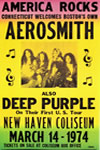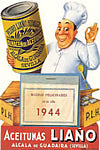Vintage Posters
The following posters are for display only, they are not for sale.
In the store: Movie Paintings
The artistic value of posters is subjective, as it depends on the observer's affinity with the theme or concept displayed. For example, a poster of the movie "Titanic" can be very valuable to someone who likes that film or the actors and not to someone who does not know it.
The origin of the modern poster dates back to 1870s France, where lithography artists developed techniques for color improvement and mass production. Since then, they have been primarily used to display advertising and political propaganda.
By 1890, they had spread throughout Europe, and numerous well-known artists were dedicated to their design.
 Music Band Posters |
 Movie Posters |
 Advertising Posters |
In the store: Movie Paintings
What is a Poster?
It is a printed card on one side with figures or text that convey an advertising, propaganda, or conceptual message. What differentiates posters from other works of art such as engravings, paintings, or prints is their explicit communicative nature. Posters are valued for the figures they display, which can be about musical groups, advertising, promotional movie posters, cartoons, or any subject that can use printed art on paper to promote a brand, product, or opinion on a topic.The artistic value of posters is subjective, as it depends on the observer's affinity with the theme or concept displayed. For example, a poster of the movie "Titanic" can be very valuable to someone who likes that film or the actors and not to someone who does not know it.
History of the Poster
The historical origin of the poster took place in the 15th century, craftsmen manually made each printed sheet. The initial purpose of posters was to convey all kinds of political or advertising information to passersby on the streets. The first known maker was Jean Michel Papillon, the first artist to sign his works.The origin of the modern poster dates back to 1870s France, where lithography artists developed techniques for color improvement and mass production. Since then, they have been primarily used to display advertising and political propaganda.
By 1890, they had spread throughout Europe, and numerous well-known artists were dedicated to their design.